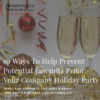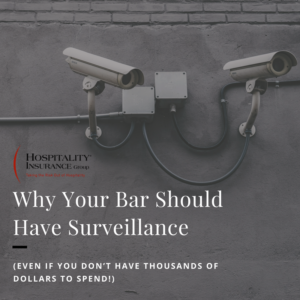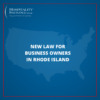Insuring The Liquor Business
Name: Richard (Dick) Welch
Title: President and CEO, Hospitality Insurance Group
Age: 57
Experience: 30 Years
 For the last three decades, Richard Welch has held a variety of roles in the insurance industry in Massachusetts and Connecticut. He spent most of his career at Travelers Insurance where he worked for 25 years, eventually rising to president and CEO of The Premiere Insurance Co. of Massachusetts, a subsidiary of Travelers. After Travelers, Welch spent a few years as an independent consultant before joining Concord Mutual Insurance Co., where he was vice president of corporate planning. Now, the Watertown, Connecticut native is the CEO of the Hospitality Insurance Group, which has offices in Southborough, Massachusetts, and Plantsville, Connecticut. The company, which recently celebrated its 10th anniversary, began strictly as a joint underwriting authority that sold liability insurance to entities that have liquor licenses. It then expanded its model and now sells to a variety of different kinds of insurance in other states.
For the last three decades, Richard Welch has held a variety of roles in the insurance industry in Massachusetts and Connecticut. He spent most of his career at Travelers Insurance where he worked for 25 years, eventually rising to president and CEO of The Premiere Insurance Co. of Massachusetts, a subsidiary of Travelers. After Travelers, Welch spent a few years as an independent consultant before joining Concord Mutual Insurance Co., where he was vice president of corporate planning. Now, the Watertown, Connecticut native is the CEO of the Hospitality Insurance Group, which has offices in Southborough, Massachusetts, and Plantsville, Connecticut. The company, which recently celebrated its 10th anniversary, began strictly as a joint underwriting authority that sold liability insurance to entities that have liquor licenses. It then expanded its model and now sells to a variety of different kinds of insurance in other states.
Q: How did you get into the insurance business?
A: I was working for a company in another industry, which wasn’t doing very well, and I didn’t think the prospects for long-term employment there were great. So, I looked at the insurance industry. When I first interviewed with Travelers, it seemed like a great fit. They made me an offer and I spent a few years in Hartford before they transferred me to Massachusetts to manage the personal lines insurance business in the state. I became president and CEO of Travelers of Massachusetts, leading a $350 million personal lines insurance company, where we enjoyed a great deal of success, returning over $500 million in profits during my tenure.
How I ended up at Hospitality: The company’s president decided to retire last year, and the company was searching for a new CEO. I have a good relationship with a few of the board members at Hospitality, one of whom approached me about the opportunity. I liked what I heard and came on board earlier this year. It’s a great company and we have big plans!
Q: What are the challenges for insuring liquor licenses and insurance?
A: One of the biggest challenges for any business which sells liquor and holds a liquor license is to minimize their exposure and risk. Bars and restaurants encounter significant exposure if they inadvertently over-serve a customer. The potential results of such actions can lead to automobile accidents, injuries or fatalities. It’s essential for bars, restaurants and package stores to carry the appropriate amount of liquor liability insurance. As bars and restaurants are small businesses, few can afford to fund large liabilities, which could run into the hundreds of thousands of dollars for a single incident.
From the insurance company’s viewpoint, the key challenge relates to underwriting and managing claims. What are the annual sales figures? What is the company’s history? Company history is important for us to understand in assessing whether we can write a policy for an individual business.
The other consideration is for us to counsel our clients on how to reduce risk of exposure to loss, so that there are fewer bad situations and if there is one, to be certain that clients don’t do anything to make a bad situation worse. When lawsuits are filed against bars and restaurants, they are often frivolous. We work with our clients to educate them through loss control how to deal with those frivolous lawsuits.
Loss control is beneficial for bars, package stores and restaurants because it keeps our costs down, which allows us to charge our customers less. We are a mutual company, which means we are owned by policyholders. Everything we do is ultimately in their collective interest.
Q: Has the cost of liquor licenses changed?
A: The cost of licenses is regulated by communities and changes from place to place, and there hasn’t been a significant change in the cost for a restaurant or bar to obtain a license to sell alcohol. As far as the cost to obtain liability coverage, that is dependent in large part on the customer’s history – a mixture of frequency of claims and risk factors.
Hospitality Insurance Group is a niche writer within the insurance business. While there are standard insurance companies that will write liquor liability policies for restaurants, the number of agencies who will write similar policies for bars or taverns is much less. It’s a risky line of business unless you really know the specifics of this type of insurance. Our expertise translates into knowing how to assess risk, how to handle insurance claims and how to help keep costs down for the customer.
Q: What is the different between this type of insurance in Connecticut versus Massachusetts?
A: The potential liability of establishments that serve liquor is defined by something called “Dram Shop Laws.” Connecticut’s Dram Shop Law is somewhat unique in that it limits the liability to $250,000 for any single incident except in a case of the reckless service of alcohol. This limit helps keep insurance more affordable for Connecticut bars and restaurants.
Welch’s Five Favorite Writers:
- Jon Krakauer
- Michael Lewis
- Charles Mann
- Nassim Nicholas Taleb
- Levitt & Dubner


 For the last three decades, Richard Welch has held a variety of roles in the insurance industry in Massachusetts and Connecticut. He spent most of his career at Travelers Insurance where he worked for 25 years, eventually rising to president and CEO of The Premiere Insurance Co. of Massachusetts, a subsidiary of Travelers. After Travelers, Welch spent a few years as an independent consultant before joining Concord Mutual Insurance Co., where he was vice president of corporate planning. Now, the Watertown, Connecticut native is the CEO of the Hospitality Insurance Group, which has offices in Southborough, Massachusetts, and Plantsville, Connecticut. The company, which recently celebrated its 10th anniversary, began strictly as a joint underwriting authority that sold liability insurance to entities that have liquor licenses. It then expanded its model and now sells to a variety of different kinds of insurance in other states.
For the last three decades, Richard Welch has held a variety of roles in the insurance industry in Massachusetts and Connecticut. He spent most of his career at Travelers Insurance where he worked for 25 years, eventually rising to president and CEO of The Premiere Insurance Co. of Massachusetts, a subsidiary of Travelers. After Travelers, Welch spent a few years as an independent consultant before joining Concord Mutual Insurance Co., where he was vice president of corporate planning. Now, the Watertown, Connecticut native is the CEO of the Hospitality Insurance Group, which has offices in Southborough, Massachusetts, and Plantsville, Connecticut. The company, which recently celebrated its 10th anniversary, began strictly as a joint underwriting authority that sold liability insurance to entities that have liquor licenses. It then expanded its model and now sells to a variety of different kinds of insurance in other states.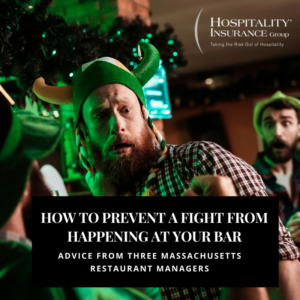 Just in time for St. Patrick’s Day, one of the busiest days in the bar industry here in Massachusetts. In this month’s blog post three Massachusetts restaurant managers share their advice on how to prevent a fight from happening at your bar.
Just in time for St. Patrick’s Day, one of the busiest days in the bar industry here in Massachusetts. In this month’s blog post three Massachusetts restaurant managers share their advice on how to prevent a fight from happening at your bar.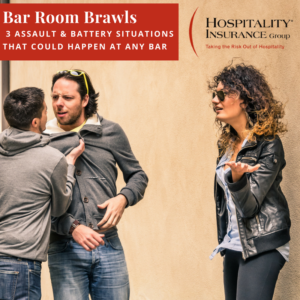 For any establishment that serves alcoholic beverages, a fight possibly breaking out is always in the back of any owner’s mind.
For any establishment that serves alcoholic beverages, a fight possibly breaking out is always in the back of any owner’s mind. 